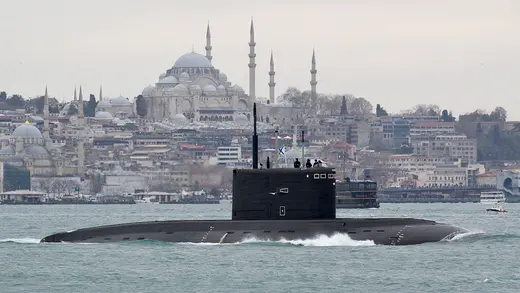Where Turkey Stands on the Russia-Ukraine War
Russia’s outsize impact on Turkish interests means Ankara is sticking to a middle ground on the war in Ukraine.
By experts and staff
- Published
Experts
![]() By Steven A. CookEni Enrico Mattei Senior Fellow for Middle East and Africa Studies
By Steven A. CookEni Enrico Mattei Senior Fellow for Middle East and Africa Studies
How has Turkey responded to Russia’s invasion of Ukraine?
The Turkish government has designated the Russian invasion as a “war,” giving it the right under the 1936 Montreux Convention to close the Bosporus Strait—which leads to the Black Sea—to warships. Although this action applies to any naval vessel, it is clearly aimed at Russia’s fleet in case Moscow seeks to reinforce the firepower it already has there. Turkey’s decision is, at least, an important symbolic one in support of Ukraine.

What’s behind Turkey’s response?
Despite the restrictions on warships in the Bosporus, it seems clear that Turkey—like other countries including Israel—has sought a strategically defensible but morally questionable middle ground. Though Turkey voted for a UN General Assembly resolution condemning Russia, it has not sanctioned Russia or closed its airspace to Russian aircraft. Some observers have been quick to highlight the differences between Turkish policy and the definitive pro-Ukraine approaches of the European Union (EU) and North Atlantic Treaty Organization (NATO), implying that Ankara is trying to have it both ways—remaining rhetorically committed to Ukraine’s independence and offering to mediate the conflict while tilting toward Russia. There is some logic to this, especially after the purchase of the Russian-made air defense system known as the S-400.
However, it is less a tilt than a recognition that Turkey’s interests are intertwined with Russia in critical areas, most importantly Syria. There, Turkey wants to prevent the emergence of a Kurdish state and maintain pressure on the People’s Protection Units (YPG), a group linked to the Kurdistan Workers’ Party (PKK), which the United States and Turkey have designated a terrorist organization. To accomplish these goals, Turkish officials have to consider Russian sensibilities, as Moscow is the most important external actor in Syria and can thus complicate Turkey’s military operations there and frustrate its diplomatic efforts.
How does Russia fit into Turkey’s broader foreign policy strategy?
In recent years, Turkey has pursued what can best be described as foreign policy independence. As an important power in the Mediterranean, the Middle East, and the Caucusus, Ankara has sought a multifaceted foreign policy that has, at times, conflicted with its NATO allies. For example, in 2017, Turkey decided to purchase S-400s. This step coincided with a growing dialogue between Ankara and Moscow that included moves to upgrade economic ties and discussions about deepening diplomatic and even military relations.
At the same time, Turkey and Russia have found themselves on opposite ends of major regional conflicts, including in Syria, Libya, and Nagorno-Karabakh, a region over which Armenia and Azerbaijan fought a recent war. Even while they were supporting different sides in these places, Turkish President Recep Tayyip Erdogan and Russian President Vladimir Putin maintained a dialogue.
What about Ukraine?
Turkey has generally supported Ukrainian independence and the country’s territorial integrity. Erdogan denounced Russia’s 2014 annexation of Crimea and has advocated on behalf of Crimean Tatars (a Turkic ethnic group) who have suffered under Russian rule. Turkey sold armed drones to Ukraine ahead of Russia’s most recent invasion, though some reports indicate that only about twelve to twenty were delivered. Still, in whatever number, Turkish Bayraktar TB2 drones are lethal and have been deployed to great effect in Libya, Syria, and Nagorno-Karabakh.
How is this war likely to affect Turkey’s interests in the region?
Turkey has sought to expand its trade and commercial relations with both Russia and Ukraine. It is also a destination for Russian tourists and an importer of oil and gas. To the extent that this war affects these ties and drives up energy prices, the Turkish economy—which is already experiencing upwards of 50 percent inflation—will feel the repercussions.
